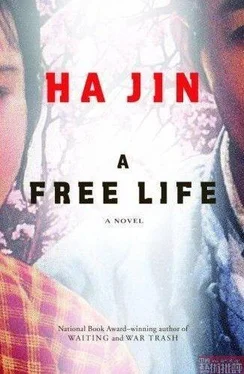Nan had heard a lot of stories about the difficulties in finding a job at a Chinese restaurant in New York. The waitresses told him that if you were unable to speak Cantonese, most places wouldn't hire you. Ding's Dumplings was one of the few restaurants in Chinatown where the owners didn't know Cantonese. Heng said he had once worked at a place where all the waiters had had to wear a short bow tie, which made him miserable, unable to breathe freely. Chinchin, the hostess, had worked in other restaurants before and also talked about how the Chinese waitstaff were exploited and humiliated by their bosses, and even mistreated by barkeeps, most of whom were Caucasians. In contrast, Howard was by far a better boss, who wouldn't dock your pay if you came to work an hour late because of an emergency. Nan felt lucky he had this job.
THE CIRCULATION of New Lines had dropped by nine percent in recent months. Bao was worried and held an editorial meeting, at which five people were present, counting himself and Nan. They were to decide whether they should expand the journal, namely to include articles on current events and social issues, and even a few advertisements. There were a good number of Chinese dissidents living in North America and willing to contribute political essays to the journal. However, except Bao, those at the meeting all opposed the idea, arguing that New Lines should remain strictly literary. Bao complained that there wasn't another way to revitalize the journal. As a compromise, they agreed to print two or three pieces of fiction in each issue, though at present they couldn't pay the authors.
Bao knew many Chinese dissidents living in New York. One Saturday morning he and Nan went to visit Mr. Manping Liu, the well-known scholar in political economy who lived near Nostrand Avenue in Brooklyn. They wanted to get the older man's endorsement for their journal. Nan had seen Mr. Liu at Harvard last June and was eager to meet him again. Mr. Liu opened the door, his eyes and mouth both sunken, and said to them, "Welcome to my hovel." His apartment had only two rooms and was on the ground floor, but in his tiny backyard were some wilting sunflowers and chrysanthemums, and also some tripods for supporting vegetables, made of whittled branches tied at the tops but all unloaded now. The living room cum study was lined with books, and a small desk stood next to the window, strewn with manuscripts. Liu was well respected in the Chinese community, not only for his incisive writings but mainly for his integrity. In June 1989, when the field armies began attacking civilians in Beijing, he had bought a large wreath and intended to take it to Tiananmen Square personally, but his friends had restrained him despite his wailing and struggling to break loose. Within a few days his name appeared on the Most Wanted list; fortunately he and his wife managed to flee to southern China and from there were smuggled to Hong Kong through an underground channel. Unlike the other dissidents in the United States, he had always refused to accept financial aid from any organization and to date had supported himself mainly by writing for Chinese-language newspapers and magazines. Also, his wife was very adaptable and worked in a gift store in downtown Manhattan.
After Bao and Nan sat down and made their case, Mr. Liu happily agreed to write a few words for their journal. But for a moment he looked rapt in thought, then moved to his small desk, uncapped his fountain pen, and wrote something on a card. He turned around and handed the endorsement to Bao. It read: "I greatly admire the young writers at New Lines. May their effort flourish and their work endure!"
Both Bao and Nan thanked him. Then his wife, a sturdy woman with a heart-shaped face, came in, holding a kettle of boiled water to make tea for them. She looked tired, saying she had worked late the night before. After serving tea, she went back into their bedroom.
Mr. Liu said he remembered an article Nan had published in the Journal of Political Economics a few years earlier. But on hearing that Nan had left the field, he said, "I understand. Life is hard here, and you have to survive first."
" Not only because of that," Nan told him. "I made a vow not to be involved in politics again. I'm not cut out for it."
"I see."
Bao put in, " Nan has been writing poetry."
"Good. Every road leads to Rome," said Mr. Liu. " China needs all kinds of talents."
Nan turned reticent, not knowing what to make of the old man's remark. Mr. Liu talked as if he were still an official.
Soon their topic shifted to life here. "I just bought a car," Liu told the visitors.
"A new one?" asked Bao.
"No. How could I afford a new car?" "How much did it cost?"
"Four hundred dollars. It's a pretty good Toyota. A friend of mine drove it and said it was better than his car that cost him over a thousand."
"Can you drive?"
" I just got my license. "
"You're very brave," Nan put in. "I wouldn't dare to drive in New York. "
"I have to be able to drive, or else I'd feel as if I'm missing a limb. Also, as long as I live here, I'll have to make a living on my own. A driver's license is a means of independence. Once I can drive really well, I'll deliver food for a restaurant."
"You shouldn't do that. You have poor eyesight, don't you?" said Bao.
The old man laughed heartily. "Maybe I can deliver computer parts in the daytime. Anyway, driving a car on the highway gives me a feeling of freedom. What fun! What exhilaration! Do you want to see my car?"
"Sure, let's have a look," Bao agreed.
On their way out, Nan said, "Mr. Liu, from now on we're going to publish two or three short stories in each issue of New Lines. If you come across any good fiction, please recommend it to us."
"I'll keep that in mind. As a matter of fact, my wife used to write fiction under the pen name Purple Lilacs. She's working too hard now, but she may write again."
Bao said, "When she finishes a piece, please show it to us first."
"By all means. I'll tell her."
Her pen name reminded Nan that he had read a novella by Mrs. Liu back in China. It had felt to him like a piece of reportage, but she had indeed had a name.
The three of them walked out of the building. Along the curbs were parked many cars, some dented and rusted, one with both front lights smashed and another wearing a boot. Nan looked back and forth, unable to determine which one might belong to Mr. Liu. The old man was taking them farther down the street, chomping on a thick pipe, a puff of smoke wafting about his head.
"This one," he said finally, pointing at a hatchback with a warped front fender.
Nan looked closely but couldn't decide what color the car was. It was battered and repainted. It appeared dark brown, but some bright orange patches were scattered all over it. "This is a good car," Bao managed to say.
" Impressive," echoed Nan.
"Want a ride?" Liu asked.
Bao and Nan exchanged glances. "Actually, we should be leaving," Bao said. " Nan 's going to work in the afternoon." "Then I can take you to the train station." " Are you sure?"
"Of course. My driving skill isn't good enough yet, or I'd drive you all the way home."
They got into the car, Nan in back and Bao in front. The seats were broken, yellow foam stuck out in spots, and there were also cigarette burns on them. An acrid smell of sweat and tobacco emanated from the interior.
"How old is this car?" Bao asked Mr. Liu.
"More than ten years old."
As soon as the engine started, the car began shaking, coughing and moaning as if it were an animal seized by a crippling pain. Nan was unnerved as he noticed a pedestrian turn to observe them. He craned to look at the odometer, which showed merely seven zeros in a row. "How many miles are on this car?" he asked Mr. Liu.
Читать дальше












